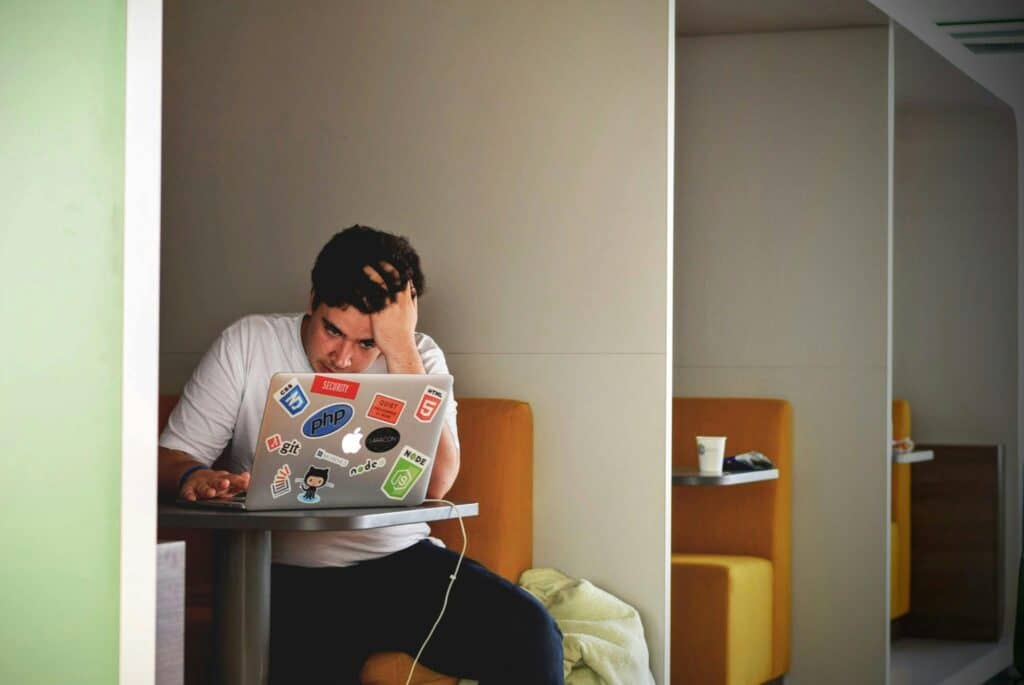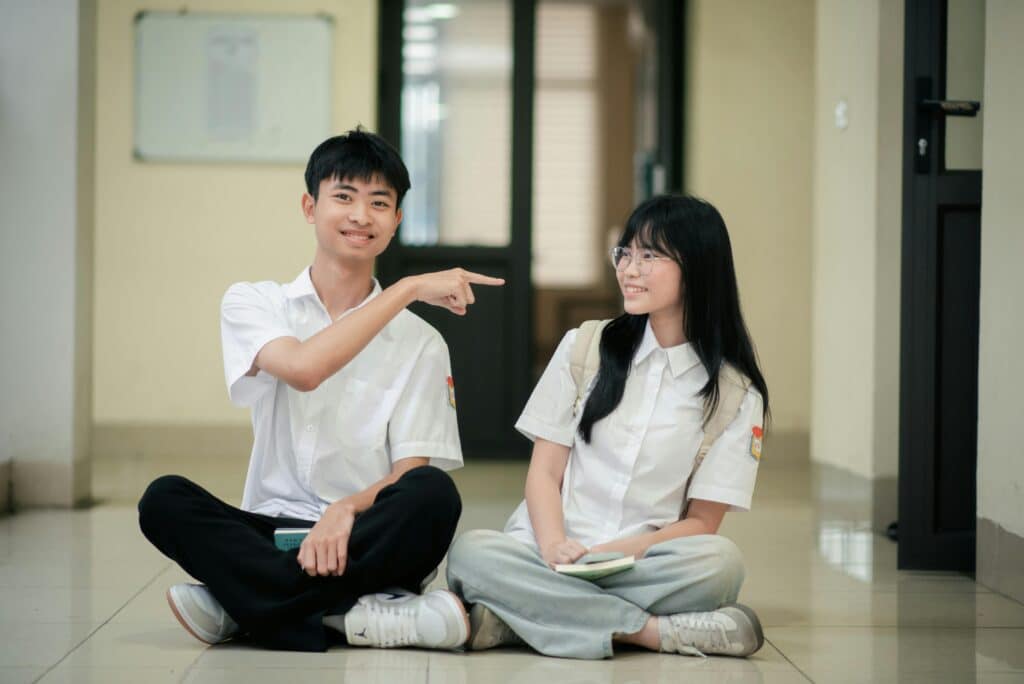The Illusion of Multitasking — A Student’s Story

It’s 11:30 p.m., and Alex, a college freshman, sits surrounded by open notebooks, half-empty coffee cups, and a glowing laptop. His playlist hums softly as he scrolls between his notes, a group chat, and a YouTube video explaining the same topic he’s supposed to be reading about. He feels busy—productive even. But as the hours pass, his focus blurs, and by midnight he can’t remember what he just read.
Alex’s night is a familiar one. Many students believe that multitasking helps them handle the avalanche of schoolwork more efficiently. But here’s the catch: the brain doesn’t actually multitask—it switches. Each time Alex shifts between studying and checking messages, his brain must refocus, wasting valuable mental energy and time.
The American Psychological Association reports that these “switching costs” can cut productivity by up to 40%, since the brain has to repeatedly reorient itself (American Psychological Association, 2020). That means students may spend nearly half their study time simply regaining focus.
Similarly, a Stanford University study found that heavy multitaskers perform worse in both working memory and attention tasks compared to those who focus on one activity at a time (Uncapher, Thieu, & Wagner, 2018). Instead of becoming more efficient, multitaskers often end up fatigued, stressed, and less effective.
Key Research Findings on Multitasking and Student Performance
| Study / Source | Main Finding | Impact on Students |
|---|---|---|
| American Psychological Association (2020) | Task switching lowers efficiency and accuracy | Productivity drops by ~40% during multitasking |
| Uncapher et al., Stanford (2018) | Heavy multitaskers have poorer working memory and focus | Lower retention and slower recall of material |
| Forbes (2020) | Multitasking raises stress levels | Increased fatigue and decreased cognitive performance |
| UConn Today (2015) | Students who multitask while studying take longer to complete work | Study time increases, grades decrease |
Multitasking gives the illusion of speed, but science reveals it’s a slow road to shallow learning.
The Hidden Cognitive Costs of Multitasking

At first glance, multitasking feels like a survival skill in school—especially when assignments, social life, and part-time work collide. But beneath the surface, the science tells a harsher truth: multitasking isn’t making students faster; it’s quietly draining their mental energy, decreasing comprehension, and reducing what they actually retain.
The Science Behind Multitasking and Cognitive Load
When students jump from a lecture to a text message or switch between tabs while writing an essay, their brain experiences attention residue—the lingering trace of the last task that makes it harder to focus fully on the next one. Each switch forces the brain to reconfigure itself, costing precious mental energy and slowing task completion (Monsell, 2003).
- Studies show that task-switching can increase cognitive load by 20–40%, meaning students are working harder but accomplishing less.
- Multitasking also interferes with executive function, which governs planning, problem-solving, and working memory. This is especially critical for students managing multiple assignments, exams, and projects.
- Students who multitask excessively often report feeling mentally drained, even after short study sessions, because their brains expend more energy maintaining focus on fragmented tasks.
Evidence on Multitasking and Academic Performance
Research consistently shows that multitasking impairs memory, comprehension, and overall academic performance:
- Stanford University Study (Uncapher, Thieu, & Wagner, 2018): Heavy multitaskers performed significantly worse on working memory and attention tasks compared to single-taskers.
- Ophir, Nass, & Wagner (2009): Students engaging in frequent media multitasking scored 11–17% lower on memory tests than peers who focused on one task at a time.
- Sana, Weston, & Cepeda (2013): Multitasking during lecture-style activities, such as checking social media on laptops, lowered exam scores and reduced retention of core concepts.
How Multitasking Undermines Learning

- Reduced comprehension: Students may read the same passage multiple times without fully understanding it.
- Shallow learning: Switching between tasks encourages surface-level memorization rather than deep understanding.
- Weakened memory: Constant multitasking interferes with long-term encoding, making it harder to recall information later.
- Increased errors: Rapid task switching increases mistakes in calculations, essays, and note-taking.
- Higher stress levels: Juggling multiple stimuli releases cortisol, which can further impair cognitive performance.
- Longer study time: Students may spend more time completing assignments when multitasking because of inefficiency.
- Lower academic performance: Multitasking correlates with reduced exam scores and GPA drops.
- Overconfidence bias: Students often believe they are effective multitaskers, yet studies show the opposite.
Table 2. Cognitive Effects of Multitasking in Educational Settings
| Cognitive Function | Impact of Multitasking | Supporting Study |
|---|---|---|
| Working Memory | Decreases ability to retain and manipulate information | Ophir, Nass, & Wagner (2009) |
| Attention Span | Shortens due to constant task-switching | Rubinstein, Meyer, & Evans (2001) |
| Comprehension | Reduced ability to grasp complex concepts | Sana, Weston, & Cepeda (2013) |
| Stress Regulation | Increases cortisol and cognitive fatigue | Mark, Gudith, & Klocke (2008) |
| Academic Performance | Lower exam and assignment scores | UConn Today (2015) |
| Perceived Efficiency | Students overestimate their productivity | Kraushaar & Novak (2010) |
Practical Scenarios of Multitasking in School
Consider a student named Jamal, who attempts to finish a problem set while listening to a lecture and texting a friend about dinner plans. Studies show that multitasking in this way can reduce retention by 15–20% and increase the time needed to complete homework by up to 50%. Even when students feel “productive,” the net result is slower, less effective learning.
Another example involves online classes. Research from Kent State University shows that students are significantly more likely to multitask in online learning environments than in face-to-face settings, frequently switching between the course platform, messaging apps, and social media (Kent State University, 2015). This behavior not only reduces comprehension but also affects grades and engagement.
Why Students Misjudge Their Multitasking Ability
- Students often underestimate the frequency of task switching; texting and social media are especially underestimated by up to 40%.
- The “busyness illusion” tricks students into equating activity with productivity.
- Feeling engaged in multiple tasks can boost confidence temporarily, even as actual learning suffers.
- Multitasking reduces self-regulation, making it harder to complete tasks without external reminders.
Strategies That Highlight the Cost of Multitasking
- Time-blocked study sessions: Focus entirely on a single task for 25–50 minutes, followed by a short break (Pomodoro technique).
- Environment control: Silence notifications, close unrelated tabs, and choose quiet spaces.
- Sequential tasking: Complete one task fully before moving on to the next.
- Active learning: Instead of passive reading while scrolling, take notes or solve problems actively.
- Interleaving: Alternate topics in a controlled manner rather than switching randomly between tasks.
Table 3. Multitasking vs. Single-Task Focus
| Feature | Multitasking | Single-Task Focus |
|---|---|---|
| Attention | Fragmented | Fully engaged |
| Learning Retention | Low | High |
| Time Efficiency | Reduced | Improved |
| Stress Levels | Increased | Lower |
| Task Accuracy | More errors | Fewer errors |
| Cognitive Fatigue | High | Moderate |
By understanding the cognitive cost of multitasking, students can begin to restructure their study habits. Research shows that even small changes, like disabling notifications or dedicating a laptop exclusively to note-taking, can improve retention and reduce stress.
How We Can Help Students Stop Multitasking
At ScholarlySphere, we provide blogs and articles about education and learning that translate these research findings into actionable strategies. Our resources include:
- Guides on focused study methods like Pomodoro and time blocking
- Tips for digital discipline, particularly for online learning and homework
By exploring our articles, students can replace the inefficient habit of multitasking with focused, effective learning routines that respect how the brain actually works.
Stop Multitasking — Strategies That Work

After understanding the hidden costs of multitasking, the next step is actionable change. Students often feel trapped in the cycle of juggling multiple tasks, but research-backed strategies can help replace multitasking with focused, efficient learning.
1. Time-Blocking and the Pomodoro Technique
One of the most effective ways to combat multitasking is structured study sessions.
- Pomodoro Technique: Work intensely on a single task for 25–50 minutes, then take a 5–10 minute break.
- Time-Blocking: Allocate specific hours for reading, problem-solving, and review sessions, ensuring no overlap of tasks.
Studies show that students using focused work blocks can increase retention by up to 30% compared to those who multitask (Uncapher, Thieu, & Wagner, 2018).
2. Remove Digital Distractions
Phones, social media, and unnecessary browser tabs are the biggest culprits.
- Put devices on “Do Not Disturb” mode.
- Use apps that block distracting websites during study sessions.
- Create a dedicated workspace free of notifications and clutter.
By reducing interruptions, students regain attention and improve memory recall for lectures and assignments.
3. Sequential Tasking
Instead of juggling multiple things simultaneously:
- Complete one assignment fully before moving to the next.
- Take brief pauses between tasks to allow the brain to reset.
- Use checklists to visualize progress, which reinforces motivation and focus.
Sequential tasking improves productivity and decreases errors caused by fragmented attention.
4. Interleaving and Spaced Practice
Research in cognitive psychology suggests that interleaving—alternating between related topics in a controlled way—improves long-term learning more than random multitasking.
- For example, study math, then review biology, then return to math.
- Spaced repetition of topics consolidates memory and prevents cramming.
This method helps students study smarter, not harder, replacing the false efficiency of multitasking.
5. Mindfulness and Mental Reset
- Brief meditation or deep-breathing exercises can help reduce cognitive fatigue.
- Mindfulness encourages sustained attention and reduces the urge to check messages or tabs constantly.
Even 5 minutes of mindfulness before studying can significantly improve focus and reduce distractions.
Bullet Points: Practical Habits to Replace Multitasking
- Use single-task timers to enforce focused sessions.
- Keep a “distraction notebook”: jot down non-urgent thoughts or reminders instead of switching tasks.
- Set daily learning goals instead of attempting to do everything at once.
- Practice self-reflection: track how multitasking affects comprehension and adjust routines.
- Reward yourself for uninterrupted work sessions, reinforcing the habit of focus.
Table 4. Multitasking vs. Focused Study Habits
| Strategy | Multitasking | Focused Approach |
|---|---|---|
| Task Completion | Slow, fragmented | Efficient, complete |
| Memory Retention | Low | High |
| Stress Level | High | Lower |
| Error Rate | Frequent | Minimal |
| Satisfaction | Low | Higher |
| Academic Performance | Decreased | Improved |
How ScholarlySphere Helps Students Implement These Strategies
At ScholarlySphere, we offer blogs and articles about education and learning that guide students through actionable methods to overcome multitasking:
- Step-by-step guides for focused study routines
- Insights on cognitive science research explained for students
- Templates, worksheets, and planners for distraction-free learning
- Stories of students successfully transitioning from multitasking to high-efficiency study habits
Our content equips students with the knowledge and tools to reclaim focus, retain information, and achieve better academic results.
Conclusion

Multitasking might feel like a shortcut, but for students it’s a productivity trap. The evidence is clear: it lowers memory, reduces comprehension, increases stress, and ultimately hinders academic performance. By adopting focused study strategies, reducing distractions, and practicing mindful, sequential learning, students can improve retention, efficiency, and confidence.
Breaking the multitasking habit isn’t easy, but the payoff is significant. By leveraging research-backed techniques and making small, consistent changes, students can learn in a way that aligns with how the brain naturally processes information.
So, are you ready to put multitasking behind you and embrace a study routine that truly works?
Works Cited
American Psychological Association. (2020). Multitasking: Switching costs. Retrieved October 5, 2025, from https://www.apa.org/topics/research/multitasking
Forbes. (2020). How multitasking erodes productivity and dings your IQ. Retrieved October 5, 2025, from https://www.forbes.com/sites/curtsteinhorst/2020/02/20/how-multitasking-erodes-productivity-and-dings-your-iq
Kent State University. (2015). Off task during online learning: Student multitasking increases in online courses. Retrieved October 5, 2025, from https://www.kent.edu/kent/news/kent-state-study-finds-student-multitasking-increases-online-courses
Kraushaar, J. M., & Novak, D. C. (2010). Examining the effects of student multitasking with laptops during the lecture. Journal of Educational Computing Research, 43(3), 229–245. Retrieved October 5, 2025, from https://educationaltechnologyjournal.springeropen.com/articles/10.1186/s41239-018-0096-z
Mark, G., Gudith, D., & Klocke, U. (2008). The cost of interrupted work: More speed and stress. CHI ’08 Proceedings of the SIGCHI Conference on Human Factors in Computing Systems, 107–110. Retrieved October 5, 2025, from https://dl.acm.org/doi/10.1145/1357054.1357072
Monsell, S. (2003). Task switching. Trends in Cognitive Sciences, 7(3), 134–140. Retrieved October 5, 2025, from https://www.sciencedirect.com/science/article/abs/pii/S136466130300035X
Ophir, E., Nass, C., & Wagner, A. D. (2009). Cognitive control in media multitaskers. Proceedings of the National Academy of Sciences, 106(37), 15583–15587. Retrieved October 5, 2025, from https://www.pnas.org/doi/10.1073/pnas.0903620106
Rubinstein, J. S., Meyer, D. E., & Evans, J. E. (2001). Executive control of cognitive processes in task switching. Journal of Experimental Psychology: Human Perception and Performance, 27(4), 763–797. Retrieved October 5, 2025, from https://psycnet.apa.org/record/2001-17376-007
Sana, F., Weston, T., & Cepeda, N. J. (2013). Laptop multitasking hinders classroom learning for both users and nearby peers. Computers & Education, 62, 24–31. Retrieved October 5, 2025, from https://www.sciencedirect.com/science/article/pii/S0360131512002260
UConn Today. (2015). Multitasking increases study time, lowers grades. Retrieved October 5, 2025, from https://today.uconn.edu/2015/07/multitasking-increases-study-time-lowers-grades
Uncapher, M. R., Thieu, M. K., & Wagner, A. D. (2018). Media multitasking and memory: Differences in working memory and long-term memory. Psychological Science, 29(2), 101–112. Retrieved October 5, 2025, from https://www.scientificamerican.com/article/media-multitasking-disrupts-memory-even-in-young-adults

